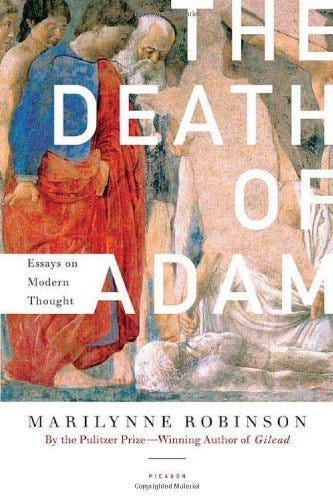Is the Christian God the Watchmaker? Marilynne Robinson Says "No!"

I've said before that I have a great respect for the writings of Marilynne Robinson. I haven't read as much of her writings as I'd like, and so on a recent vacation I decided to pick up her collection of essays, The Death of Adam: Essays in Modern Thought, which was published in 1998.
One common way of thinking about the Christian God is as the Divine Watchmaker, which I believe comes from William Paley's description of the teleological argument in Natural Theology. (The teleological argument is, roughly, the argument from the evidence of the universe being designed to the existence of a Designer.) What does it mean to think of God as the Divine Watchmaker? Basically, that God is to the world what a watchmaker is to a watch.
But is the Christian God best thought of as a Divine Watchmaker?
In her essay, "Darwinism," Marilynne Robinson writes:
The God of Abraham, Isaac, and Jacob, or of Luther, Calvin, and Ignatius of Loyola, or of Dietrich Bonhoeffer, Simone Weil, and Martin Luther King, is no Watchmaker. To find him at the end of even the longest chain of being or causality would be to discover that he was a thing (however majestic) among things....
If one looks at the creation narrative in Genesis one finds no Watchmaker, as the Darwinists would have us believe, but a God who stands outside his creation, and calls it into being by, in effect, willing its existence. This terse account does as little to invoke the model of a human artisan as it could do. The creation and blessing of everything, from light to the great sea creatures to whatever creeps on the part, is done in the same formulaic terms. It all has the same origin, and it is all good....
The narrative stabilizes essential theological assertions, first of all, that God is not embodied in any part of creation. He is not light, nor is he the sun, as the gods of other ancient people were thought to be. He is in no sense limited or local. He is not the force of good or order struggling against forces of evil or chaos, but the sole creator of a creation that is in whole and in part 'very good.' There are no loci of special holiness, humanity aside, and nothing evil or alarming or unclean. The sun and moon are simply 'lights' and the markers of days and seasons. The alternation of day and night are not the endless recurrence of a terrifying primal struggle but the frame of a great order, identified by the repeated reference to evening and morning with the ordering of creation itself. All these things articulate a vision of being which is sharply distinct from those expressed in competing ancient cosmogonies. The narrative, with its refrain, tells off the days in a week, and culminates in the Sabbath, which is, therefore, as fundamental a reality as creation itself. It is as if God's rest were the crown of his work. This is a very powerful statement of the value of the Sabbath, so essential to the life of the Jews, and it seems to me it probably accounts for the fact of the narrative's describing creation as the business of a week.
Certainly this cosmogony describes a natural order which is freestanding and complete, with rainfall and seasons established, as well as the fecundity of all living things....
[The Genesis cosmogony is] not in the least degree animistic or demon-haunted or dependent for its functioning on divine intervention. If ancient people had consciously set out to articulate a worldview congenial to science, it is hard to imagine how, in the terms available to them, they could have done better. And in fact, Judeo-Christian culture has been uniquely hospitable to science." (pp. 37-39; emphasis mine)
I know this was a long quote; forgive me for including much that was only tangentially related to the question of whether the Christian God can be thought of as a Divine Watchmaker. But it is essential to her rejection of the Divine Watchmaker conception of God that you understand that the opening chapters of Genesis work hard to show that God is not just some other "thing among things," as she puts it.
A watchmaker is just a thing intelligent enough and powerful enough to create a watch. And, if God is the Divine Watchmaker, then He is just a thing supremely powerful and intelligent, intelligent and powerful enough to create the world.
But what bothers Robinson (and other Christian thinkers throughout the history of Christianity) about this conception of God is that it doesn't seem to portray the radical distance between God and everything else that the Bible portrays. It brings God closer in kind to His creation than the Bible does. (After all, in the larger scheme of things, the watchmaker isn't that distinct from a watch.)
Though I don't have the book in front of me to double-check, I think that Brian Davies writes that Thomas Aquinas's view of God was very much in line with what Marilynne Robinson is describing. Aquinas himself worked hard to avoid conceiving of God as a "thing among things."
So, whether you accept or reject Robinson's key point here, you at least have to admit that it isn't obvious that Christians should easily accept the Divine Watchmaker view of God, a view prevalent in most of the writings in apologetics.

